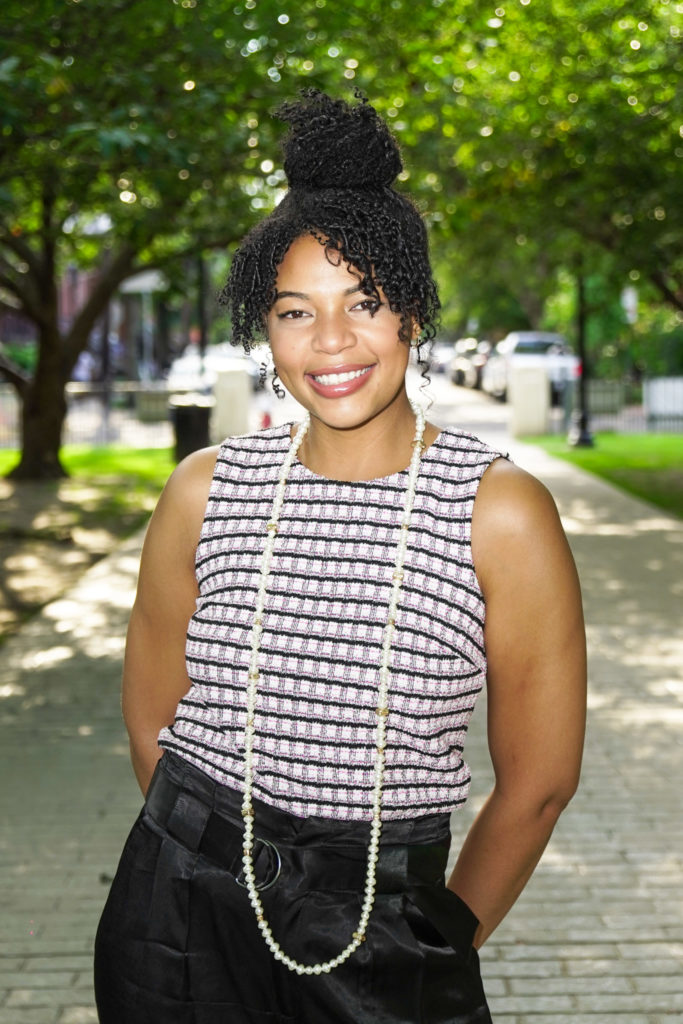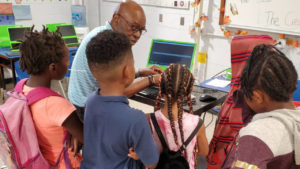One afternoon in March 2010, Khaliah Fitchette, a 16-year-old student at Newark’s University High School, was riding home on a NJ Transit bus with her friends when an intoxicated man slid off his seat and onto the floor. The bus stopped and two Newark police officers ran in. Khaliah started filming them on her phone and the officers told her to stop. When she refused, the officers dragged her off the bus, handcuffed her, and threw her into the back of the police car. Her friends started a #FreeKhaliah campaign while she begged to call her mother. But the officers confiscated her phone, deleted the video, told her they were charging her as an adult for obstruction of justice, and took her to the precinct where she was detained for six hours.
The story was picked up by multiple media outlets, including NPR, CBS, and Today, especially after the ACLU and the Seton Hall Law School Center for Social Justice filed a lawsuit on March 28, 2011, against the Newark Police Department on behalf of Khaliah.
She won the lawsuit. She continues to speak out for social justice. And, ten years after the bus incident, 27-year-old Khaliah Fichette is running for the U.S. Congress.
To what does she attribute her extraordinary accomplishments?
In large part to KIPP New Jersey, an expansive public charter operator in Newark and Camden. Across the country, the network operates 255 schools serving more than 100,000 students and just announced a major initiative to help its alumni succeed throughout and after college.
“We found out that our college graduates were coming out of college and not landing jobs, or not landing jobs that helped them move up,” said Nancy Kyei, manager of KIPP’s Alumni Impact Team, which oversees the effort. “They were finding jobs, but not careers. It’s tough because our graduates don’t have a network of family and friends that generations of affluent students have had coming out of college.”
I wanted to speak to Khaliah about how one charter school could have such a large impact on her life. Here is our (lightly edited) conversation.
What were your school experiences as a young child?
I was born in Newark but for my very early school years went to several schools in Maryland and Delaware because my mom and I moved around a bit. In one of those schools I was the only Black kid. When I was 8 we went back to Newark to stay and I started third grade at the district’s Peshine Avenue School. [Currently 22% of Peshine Avenue’s third-graders read on grade level, an important benchmark for future academic success.] Peshine was right across the street from KIPP’s TEAM Academy, which had just opened, and my cousin went there. My mom called my aunt and asked her, “How do I get Khaliah in?” Back then TEAM had a legacy system and being a cousin counted! It doesn’t anymore — I tried to get my cousin in recently. So I started KIPP in fifth grade, its second year of operation.
Did you like going to KIPP? Was it a hard transition from a traditional district school to a public charter?
This is what I remember most about my first day at TEAM: It was pouring rain as our bus pulled up and our principal, Ryan Hill, was standing outside the front door and welcoming us in, one by one. I had never had an adult shake my hand before!
While I didn’t know the word then, what most impresses me is the level of accountability. Mr. Hill and the other teachers sat on the floor and told us, “we’re going to make you successful. We won’t baby you. We won’t give you a pacifier.” They pushed us in the very best way. People assumed we couldn’t excel because we came from Newark. KIPP assumed otherwise.
And, so, the transition was easy for me — I’ve always been ahead of myself academically and I was ready to be responsible for my learning.
What happened after you graduated from TEAM Academy?
First I went to Peddie, a New Jersey private school. It was a huge culture shock and I only lasted two years. I had never gone to school with white rich kids who all had tutors while I was working at McDonald’s to help pay for my tuition. I was socially unprepared to go to school with the 1%.
And so I applied to one of Newark’s magnet schools, University High School, for 11th grade. Everyone had to test in but because I had gone to a fancy boarding school I didn’t have to take any admissions tests. I loved University High School. I was very involved and loved being around smart Black kids. KIPP and University High School were the first two schools where I felt at home.
Where did you go to college?
Cornell University.
Wow!
Yes, I shot for the stars and it worked out. I was the first KIPPNJ alum to go to an Ivy League college. I can be willful! My college counselor at University High School said I wouldn’t get it in, that it was a reach, but that didn’t stop me. And my mom really encouraged me — she’s always been my biggest supporter. Also, I knew that people assume that if you have a degree from a prestigious school, you’re great.
Did you like Cornell?
I loved it. One of the highlights was in my senior year I interned for U.S. Senator Lamar Alexander in his education office. KIPP has a program where, if you can get an internship, they’ll pay our housing and give us stipends so we can experience D.C. like kids who can afford it. While I was there, I advocated for expanding charter schools. After all, I never would have been there without KIPP.
What did you do after college?
Oh, a variety of things. I lived in Los Angeles, took a working vacation to Alaska, worked for Democrats for Education Reform in Brooklyn. I did go back to Newark but I didn’t fit in. Everything in Newark was the same but I was different. All my University High School friends were postal workers and bartenders. They hadn’t achieved their potential.
And now you’re running for a national office.
Yes. Hey, I’m 27, only two years younger than AOC! And the Breonna Taylor story made me think, “I could have been killed. Any of my friends could have been killed. It can happen to anyone.”
Look, I’m a poor Black woman from Newark. Yet KIPP has instilled in me the mentality that I can do this, I can create space for people who look like me to fulfill their dreams, even running against a legacy politician for public office.
What do you think of the Democratic platform on schools like KIPP?
I think the biggest misconception of charter schools is that they’re creaming off top students and leaving traditional schools with less intelligent kids. I know this doesn’t happen in Newark. Look, until we fix our traditional public schools, we have to offer families like mine options. If you say, like Phil Murphy, that we don’t deserve a choice of where we go to school, you’re damning us. It’s ridiculous that our public education system is so bad. Every school should be like KIPP and offer a high-quality education. The fact that kids get shunted to schools like Peshine Avenue is on our elected officials because they haven’t addressed the root causes of student failure.
I’m determined to change this.





